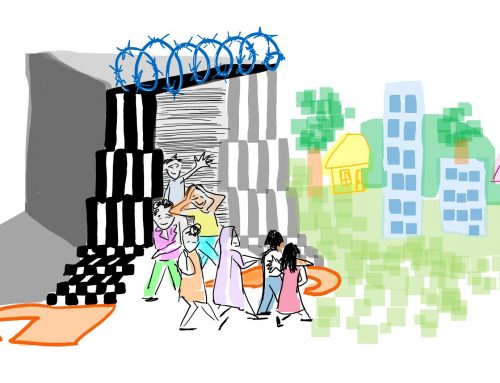Photo by Zhifei Zhou on Unsplash
Living under Theresa May’s reign as migrants was like a nightmare, and its catastrophic impact has not ended. After May’s dramatic resignation speech on 24 May, ‘Hostile Environment’ policies continue. And the UK’s inhumane immigration system, including its vast immigration detention estate and its practice of locking up migrants with no time limit, remains intact.
24 May was also the day that the Home Office’s quarterly statistics were published. With the noise surrounding the resignation speech, few paid any attention to the plight of 24,333 people who entered the detention estate in the year ending March 2019. I wondered how this news was greeted in the detention centres up and down the country: with indifference or with anger?
It is tempting to fantasize that a change of Prime Minister, Home Secretary or governing party will magically vanish hostility against the Other. The sobering reality is that similar hostility existed under the Labour government not so long ago. When I started working with asylum seekers in 2000, it was Jack Straw who was Home Secretary. The only appropriate word I can think of to describe the treatment of asylum seekers I saw was ‘appalling’. To this day, I still remember vividly an elderly Afghan man, with tears in his eyes, begging me to contact the Home Office again because his subsistence vouchers were terminated with no notice. The office I used to work at dealt with hundreds of people like him, day in day out. It was also at the same time that I first stepped into a detention centre, Harmondsworth, a place of utter despair. There was indefinite detention back then as there is now. I hate to disappoint you but a world without Hostile Environment policies was far from perfect.
Clearly, hostility towards migrants, refugees and asylum seekers has a much longer history than Theresa May’s career as Home Secretary and then Prime Minister – it is now the norm. And it is this long history of hostility, intertwined with the history of colonisation and underscored by a global order built on racial hierarchy, which enabled May, and all of her accomplices, to do what she did. May did indeed create a morally abhorrent Hostile Environment, aimed at demonising migrants, fuelling suspicion of the Other and making their lives miserable. The policy re-purposed the entire society into a border control machine. Of course, we’d like to think that Theresa May alone did this – it is far more comforting to think that there was a single source of ill. If only if it were that simple. The ‘Go Home’ vans were a logical extension of the acceptance of such hostility that few bothered to question.
If there was one positive outcome from Theresa May’s reign, it’s that its casual and persistent terrorising of migrant communities served as a wake-up call for many. More people started speaking out against inhumane border control practices and taking action to stop them, including politicians who voted for Hostile Environment policies in the first place. Whether it is an effort to keep health care available to all, a legal challenge against the right to rent policy, a campaign to lift the ban on asylum seekers’ right to work or growing support for immigration detention reform, solidarity with migrants, or rather, solidarity with fellow human beings, is spreading and spreading across different groups. As the Hostile Environment continues, our priority is to protect and nurture this solidarity. People coming together is a powerful force for change, and we need more of it.
It is Conservative MPs and Conservative party members who will decide the next leader of their party and the UK’s prime minister. Their choice may or may not signal an end to the Hostile Environment and a change in the UK’s immigration policy. While many of us have no formal role to play in this ongoing leadership contest, I hope our growing solidarity with fellow human beings will reject hostility and shape what comes after Theresa May.
Eiri Ohtani, Project Director, Detention Forum




